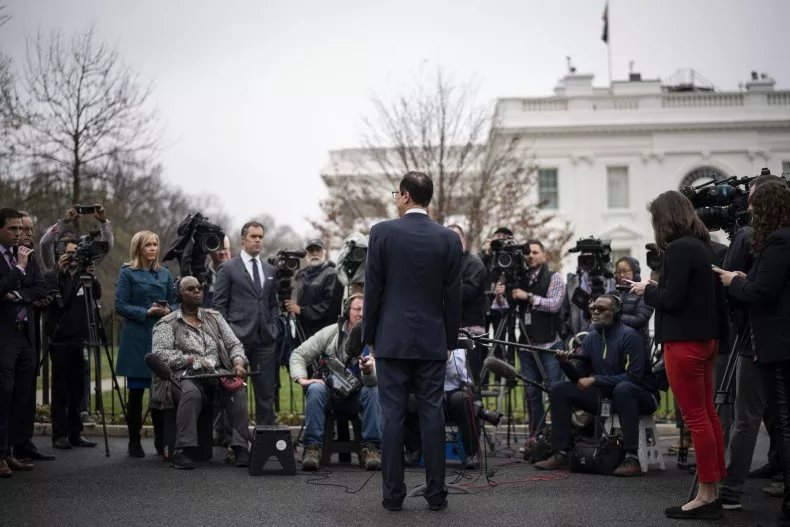OPINION ... CORONAVIRUS IS EXPOSING TRUMP'S 'STRONG ECONOMY' FOR THE HOAX IT IS | OPINION
Trump's Top Coronavirus Doctor Fauci Says It's '10 Times More Lethal Than The Seasonal Flu'
Anyone who has been watching the news this past week has seen reports of the stock market losing trillions of dollars, big corporations expressing concern about profits and economists talking about the United States potentially sliding into another recession.
Many of the reports, however, have made it seem like everything was fine until the coronavirus struck. Here's the reality: The 'strong economy' was nothing but a facade. It was about as real as President Donald Trump's claimed public health expertise. And if the COVID-19 crisis hadn't emerged to melt the shiny veneer away, it would have happened eventually.
The reason is simple. The economy is not the stock market, and it's certainly not corporate earnings. The economy is all of us. When everyday workers, families and communities are thriving, the economy will thrive along with them. Conversely, if wealth is concentrated at the top, and if whole communities of people are excluded, exploited, forgotten or scapegoated—the economy will stagnate and underperform, fail to deliver real prosperity and be inherently unstable and insecure.
So while the rosy economic headlines of the past few years have been misleading people into believing that the overall economy was strong, and that they had nobody but themselves to blame for their personal economic challenges—the vast majority of Americans have been living the recession that is just starting to be noticed by policymakers and the media.
Let's examine three deep, long-standing and interconnected weaknesses in our economy that the emerging COVID-19 crisis has shined a spotlight on.
First, while the last decade has been phenomenal for the wealthiest Americans and biggest corporations, the vast majority of workers have been struggling to keep their heads above water. Wages have been stagnating, particularly for communities of color, while the costs of housing, health care, child care and higher education have been increasing. Many families live in perpetual fear of their own financial collapse; 40 percent of Americans don't even have enough money in the bank to cover expenses in an emergency. And as the coronavirus crisis expands and if the economy contracts, workers are going to get laid off, and many of them, especially the most marginalized who have been held back by systemic racism and other obstacles, won't have the financial cushion they need to make it through the downturn.
Second, our safety net has holes large enough for entire communities to fall through, and this is going to have deadly consequences over the coming months. Unlike almost every other industrialized nation, millions of Americans don't have access to paid sick leave. This, combined with the lack of economic cushion, means that workers are going to feel financial pressure to show up to work when they are sick—making the crisis far worse than it needs to be. The same is true for health care, where over 44 million Americans lack coverage, many more are underinsured and can't afford their deductibles and copayments—far too many of whom will be forced to roll the dice and go without care when the best thing they can do for themselves and their communities is get treated.

Steven Mnuchin
Treasury Secretary Steven Mnuchin speaks to the press outside of the West Wing of the White House on March 13. Mnuchin fielded questions about the economic effects of the coronavirus pandemic.
DREW ANGERER/GETTY
Third, with inequality at extreme levels and so many Americans living paycheck to paycheck, consumer demand can melt away in the blink of an eye and a seemingly scorching economy can nosedive in the blink of an eye. With more and more of our nation's wealth shifting to the top, businesses cater to an increasingly rarefied sliver of super-rich consumers and therefore fail to invest in workers broadly. This is easy for some to paper over when the economy seems like it's expanding, but when the spending of the richest Americans slows down in a recession, there is no broad demand from struggling workers to make up the gap.
Crises like this one don't just expose problems, they also shine a spotlight on steps the policymakers can take to use public power to solve the major structural problems that have been exposed in the economy. So as Trump and Congress now scramble to enact policies to try to avoid a recession and to help families get through this crisis, use this moment to actually address the fundamental weaknesses that can no longer be denied—not just paper them over with more tax breaks and attempts to juice Wall Street.
This is not a moment for policymakers to start worrying about the deficit and debt, which they didn't seem concerned about when they supported trillions of dollars in tax cuts for the rich. This is a moment when the most expensive option—for families and for the overall economy—is to fail to act or not act aggressively enough.
The COVID-19 outbreak is horrific, and hopefully we work through this crisis as best as we can, with as few lives lost as possible. But the weaknesses that have been exposed aren't new, their impact isn't surprising, and hopefully policymakers can use this moment to get our economy back on track.
To build a strong economy, we have to invest in and support the wellspring of our prosperity: all of us. That should start right now.
Angela Hanks is the deputy executive director of Groundwork Collaborative.
The views expressed in this article are the writer's own.
REQUEST REPRINT & LICENSING, SUBMIT CORRECTION OR VIEW EDITORIAL GUIDELINES
CORONAVIRUS IS EXPOSING TRUMP'S 'STRONG ECONOMY' FOR THE HOAX IT IS | OPINION | OPINION
Loading...
| |

